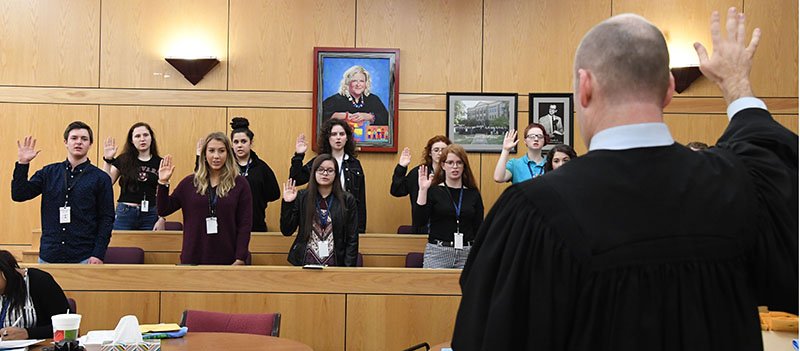Teen Court, the latest diversion program introduced to the juvenile court system, held its first mock trial Monday night in preparation for the actual proceedings the students will experience in the months to come.
Officials who participated in overseeing the mock trial said they were hopeful the program will have a positive impact on juveniles on both sides of the program.
"Teen Court is another diversion program. We have ramped up our diversion programs (across the board) and this is basically the fourth leg to the chair of diversion. When you look at it nationally, the recidivism rates for Teen Court are even lower than regular diversions," said Division 2 Circuit Court Judge Wade Naramore.
The Teen Court program is designed to steer low and moderate risk juvenile delinquents away from the courtroom. It also gives high school students interested in the field of criminal justice the chance to experience firsthand their prospective career by hearing actual court cases.
Juniors and seniors from area schools make up the volunteers who will try two cases each month until the end of April. Each student receives training on the justice system, courtroom, protocol and the responsibilities of the various courtroom personnel, according to an information pamphlet developed for the program.
"I'm really just trying to get more experience in the law and criminal justice fields," said Eli Spainhour, one of the students. "I want to become a prosecuting attorney when I grow up. I figured it would be a good opportunity to get good in-field practice.
"I would really just like to get a better understanding of the role of a prosecuting attorney and gain a new perspective on the courtroom and how it actually works. TV is one thing but the real court cases actually taking place is totally different."
The volunteers will conduct two trials each month along with Naramore for an array of misdemeanor crimes committed by low and moderate risk juveniles. Defendants will receive a sentence from a jury compiled of their peers that must be completed within a certain period of time. If they are successful in completing the program, their case is dismissed, the pamphlet said.
Each student acting as the defense or prosecution is accompanied by a lawyer that shadows them during the trial and assists with preparations beforehand, Naramore said. This ensures that the trials are conducted fairly and accurately, while teaching students about real courtroom etiquette and proceedings.
The cases are chosen through a vetting process where a juvenile intake officer can refer a low to moderate risk case to Teen Court under the conditions that the defendant pleads guilty to the charges and agrees to complete the sentencing handed down by the Teen Court, according to probation officer Jennifer Darter.
Naramore has opted to bring the cases of younger children before Teen Court to avoid the instance of a defendant seeing a classmate in the jury box, Darter said.
"It's a good opportunity for our defendants because they are being judged by their peers and not the judge. When the (defendant's) trial is over, they will come the following week and have to volunteer as either a juror or observe. We're hoping this prompts them to mingle with kids who will be a positive influence," Darter said.
"The sentences are decided upon by the members of the teen court within reason. I've printed off reasonable sanctions for them to give set up in something kind of like a matrix. This way they're not just ordering crazy, unrealistic sentences to these kids."
Possible sentences for the students can include community service, school checks, apology letters to victims, educational classes, counseling, curfews, and jury duty in Teen Court.
Naramore said it was interesting to see how the defendant's peers held them to a high standard during the mock trial. He believes that the students in Teen Court will continue to surprise him with their abilities to absorb details of the cases and come back with fair, effective sentencing.
"I expect the kids to learn the system and get a better understanding of the criminal justice system. I think we're going to get there. It is a learning process for us too. Whenever you try a new program, you have to accept the fact you're not an expert about it. ... I'm just excited about the potential this has for both our student (volunteers) and the defenders. It's going to be fun," Naramore said.
Local on 02/14/2019